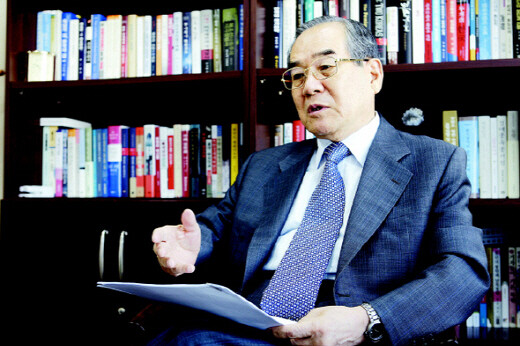hankyoreh
Links to other country sites 다른 나라 사이트 링크
[Interview] Former unification minister says N.Korea policy has been series of missteps

By Park Byong-su, Senior Staff Writer
Former Unification Minister Lim Dong-won, a facilitator for the first inter-Korean summit meeting in 2000, said Thursday that North Korea’s sudden revelations about secret contacts by the South Korean government were “the product of antagonistic government policy toward North Korea.”
During a telephone interview with the Hankyoreh, Lim, who oversaw North Korea policy under the Kim Dae-jung administration, said, “I do not believe this incident occurred due to a working-level error or inexperience in the process of the secret contacts.”
“Restoration of inter-Korean relations appears unlikely without a change in the government’s North Korea policy,” Lim predicted.
Lim also said, “Pyongyang determined that there was no point in holding an inter-Korean summit at a time when there has been no change in South Korea’s policy of antagonism.”
Hankyoreh: What went wrong?
Lim Dong-won: “The Lee Myung-bak administration’s North Korea policy was mistaken from the beginning. It presented a number of principles, including a change in position from North Korea on the nuclear issue and apologies for the Cheonan sinking and Yeonpyeong Island attack. And they halted interchange between North Korea and South Korea. Was there any chance of things working out when they try to hastily arrange a summit meeting at this point in the administration with the general and presidential elections coming up next year? Their approach was misguided, and I imagine North Korea thought they lacked sincerity.”
Hankyoreh:What should they have done?
Lim: “Holding a summit is not important in and of itself. What is important is what you discuss and resolve through holding a summit, that kind of essential content. What point is there in having a summit when you are talking about triggering a collapse in the other party?”
H: How can this be resolved?
D: “We need to provide humanitarian aid, resume the Mt. Kumkang tourism project, and resume the halted traffic between North Korea and South Korea. After all, everything was discontinued after the May 24 measures. This is the only way we can get Pyongyang to think, ‘Oh, South Korea is sincere about this.’
And the administration’s conditions about the nuclear issue are not a matter that can be resolved through inter-Korean discussions. While it is difficult to do anything about the Cheonan situation, where North Korea is claiming they didn’t do it, they did express regrets about civilian casualties in the Yeonpyeong Island attack. There is potential for narrowing differences as each side takes appropriate measures.”
H: There are still stumbling blocks with the Mt. Kumkang shooting, the Cheonan sinking, and the Yeonpyeong Island attack.
L: “Inter-Korean relations did not deteriorate because of those. Since early in its term, the administration has ignored the June 15 and October 3 declarations. It even ignored the Inter-Korean Basic Agreement. Then it presented antagonistic policies with the stated goal of triggering a North Korean collapse. The Mt. Kumkang, Cheonan, and Yeonpyeong Island incidents emerged from that process. So the starting point toward a resolution needs to be found within a change in North Korea policy.”
H: What mistakes would you point to in the secret meetings?
L: “The crux of the issue is not any kind of working-level mistake in the secret meetings. This situation didn’t happen because of problems with procedure or format. Essentially, it stemmed from South Korea’s antagonist policies toward North Korea. It is a policy issue, not something where we should be questioning the actions of the delegation.
North Korea probably also expected something would get resolved through dialogue. I think they looked at the reserves training ground where pictures of Kim Il-sung, Kim Jong-il, and Kim Jong-un were used for target practice and said, ‘Nothing has changed with South Korea’s antagonistic policies.’ We in South Korea may not think anything of this, but to North Koreans it is an extremely important issue. ”
Please direct questions or comments to [englishhani@hani.co.kr]
Editorial・opinion
![[Editorial] Does Yoon think the Korean public is wrong? [Editorial] Does Yoon think the Korean public is wrong?](https://flexible.img.hani.co.kr/flexible/normal/500/300/imgdb/original/2024/0417/8517133419684774.jpg) [Editorial] Does Yoon think the Korean public is wrong?
[Editorial] Does Yoon think the Korean public is wrong?![[Editorial] As it bolsters its alliance with US, Japan must be accountable for past [Editorial] As it bolsters its alliance with US, Japan must be accountable for past](https://flexible.img.hani.co.kr/flexible/normal/500/300/imgdb/original/2024/0417/6817133413968321.jpg) [Editorial] As it bolsters its alliance with US, Japan must be accountable for past
[Editorial] As it bolsters its alliance with US, Japan must be accountable for past- [Guest essay] Amending the Constitution is Yoon’s key to leaving office in public’s good graces
- [Editorial] 10 years on, lessons of Sewol tragedy must never be forgotten
- [Column] A death blow to Korea’s prosecutor politics
- [Correspondent’s column] The US and the end of Japanese pacifism
- [Guest essay] How Korea turned its trainee doctors into monsters
- [Guest essay] As someone who helped forge Seoul-Moscow ties, their status today troubles me
- [Editorial] Koreans sent a loud and clear message to Yoon
- [Column] In Korea’s midterm elections, it’s time for accountability
Most viewed articles
- 1[Column] The clock is ticking for Korea’s first lady
- 2[News analysis] After elections, prosecutorial reform will likely make legislative agenda
- 3Samsung barricades office as unionized workers strike for better conditions
- 4[Editorial] Does Yoon think the Korean public is wrong?
- 5‘Right direction’: After judgment day from voters, Yoon shrugs off calls for change
- 6Korea, Japan jointly vow response to FX volatility as currencies tumble
- 7[Editorial] When the choice is kids or career, Korea will never overcome birth rate woes
- 8Why Israel isn’t hitting Iran with immediate retaliation
- 9S. Korea, Japan reaffirm commitment to strengthening trilateral ties with US
- 10Japan officially says compensation of Korean forced laborers isn’t its responsibility